10 Minutes
At Startup Fair Vilnius 2025, one of the most thought-provoking panels unfolded on the Core Stage, asking a futuristic yet increasingly realistic question: Could the world soon see a billion-dollar company built and operated by a single person — with AI as their only teammate?
Moderated by Romanas Zontovičius, Head of AI Hub at Innovation Agency Lithuania, the session gathered a sharp mix of investors and founders to discuss what the rise of intelligent automation means for entrepreneurship. The panelists included Oksana Vodonos, Associate at 500 Global, Gabrielė Kriaučionytė, CEO of Neurali, and Magnus Hambleton, Investor at ByFounders. Together, they dissected the practicality, psychology, and ethical dimensions of solo entrepreneurship in the age of AI.
From Tweet to Reality: The Idea of a One-Person Unicorn
The discussion began with the viral tweet that inspired the session — a post speculating that the first “one-person unicorn” would soon emerge, powered by artificial intelligence. Romanas admitted he had followed the idea closely ever since. “Every few months I check the internet again — did it happen yet?” he said, setting the stage. “Maybe the real question isn’t whether it’s possible, but whether we even need one.”
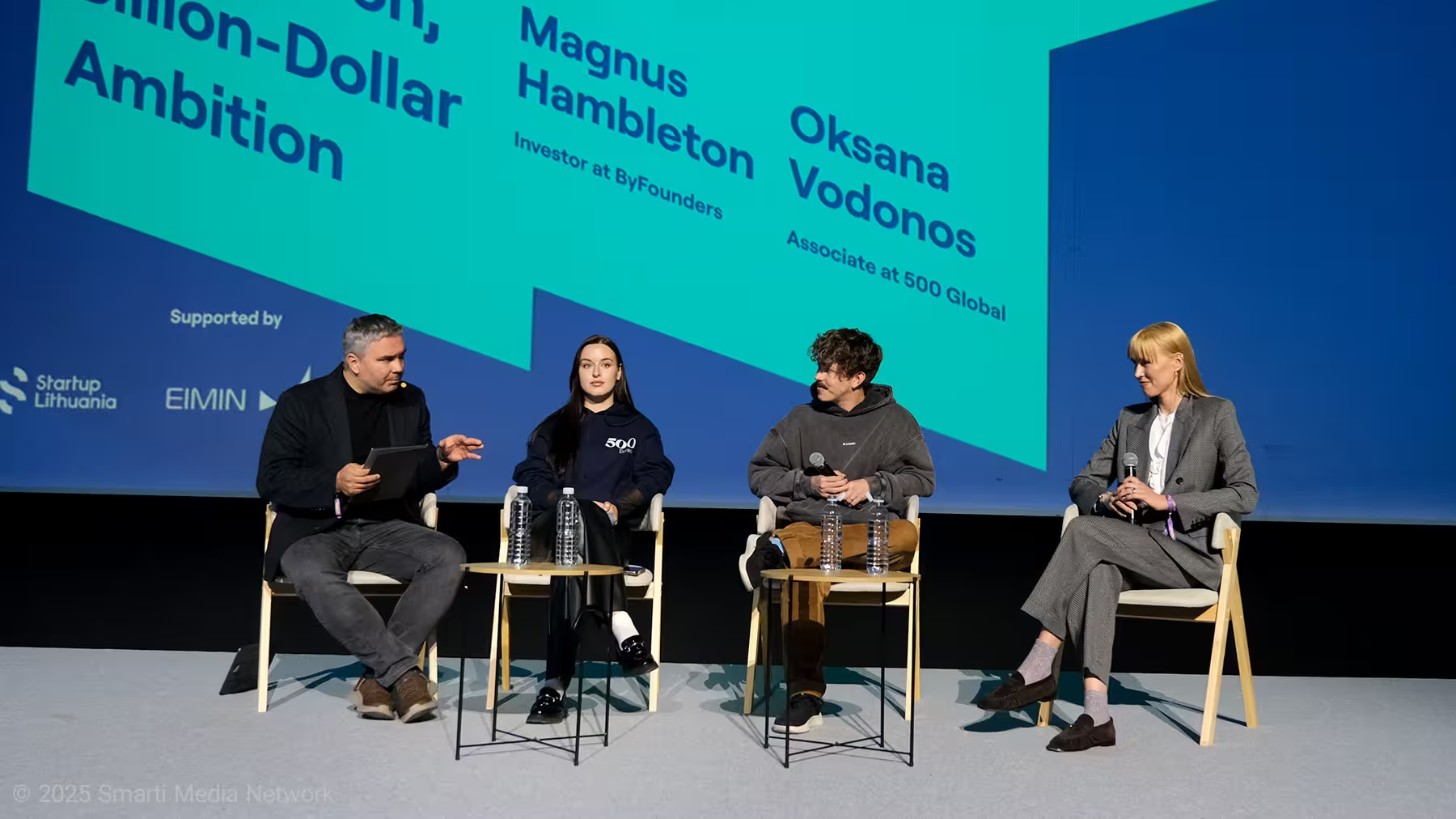
He pointed to the biggest historical barrier for solo founders: scalability. “Startups have always required teams to handle operations, marketing, HR, customer support,” he said. “But now AI has entered the picture — and that changes everything.”
Can a Founder Be Everywhere at Once?
The conversation turned to Gabrielė Kriaučionytė, a biotech entrepreneur managing multiple companies at once, including Neurali, which accelerates drug discovery through AI. When asked how she manages several ventures simultaneously, she explained that AI tools are no longer optional.
“With the tools available today, it’s possible to handle multiple roles,” she said. “We offload so much of our work to AI now. If your AI isn’t texting clients on weekends, something’s wrong.”
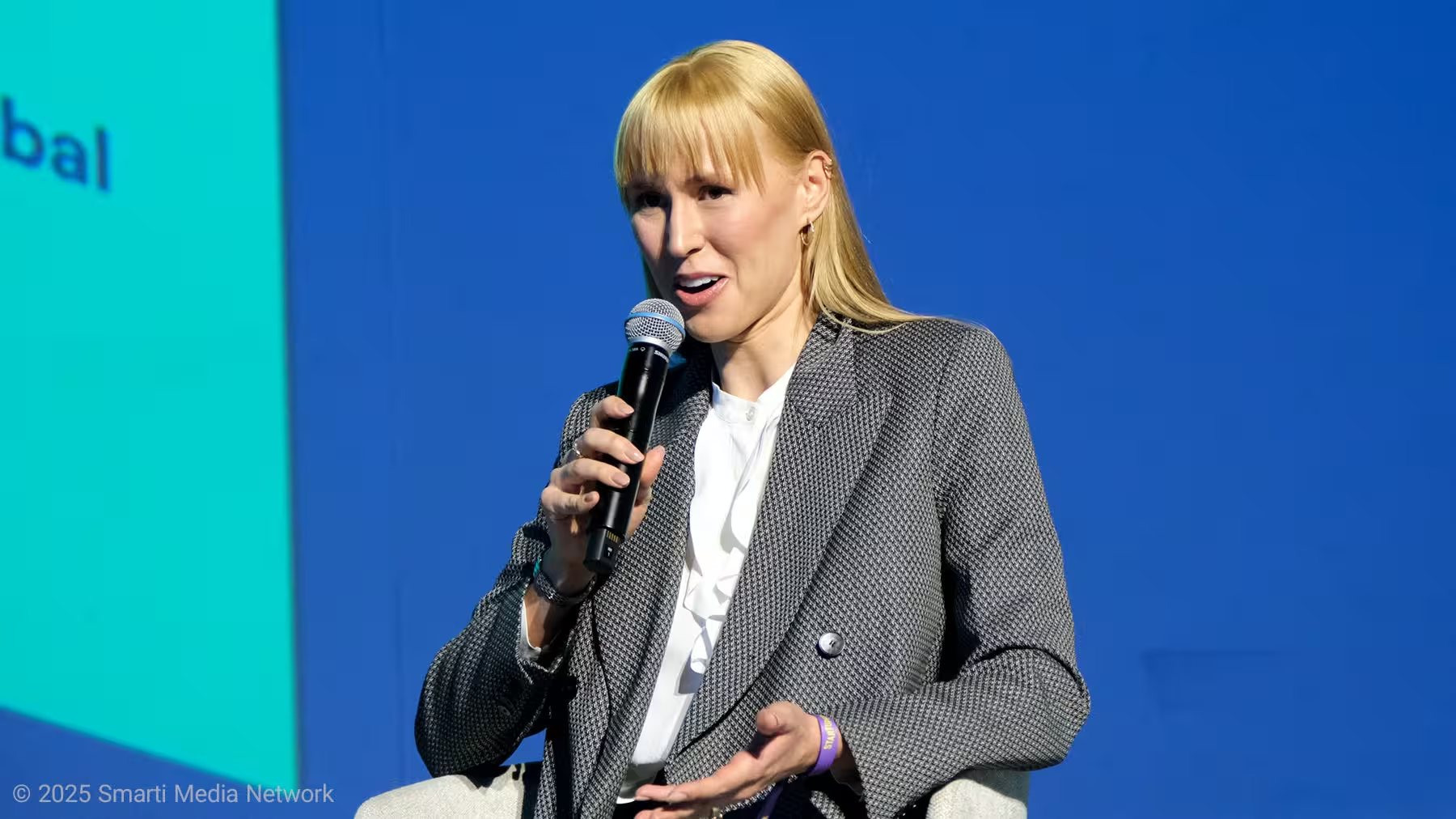
Kriaučionytė said she divides her focus between two ventures: acting as a commercial CEO in one and as a product lead in another. “It’s a balance between managerial and creative work,” she said. “Timing is key — one project is flying, another is in the early phase. That rhythm makes it manageable.”
Her perspective captured a growing reality in the tech ecosystem: that intelligent assistants now perform tasks once requiring entire departments — from communication and scheduling to research and product iteration.
The Investor’s Perspective: How Small Can a Startup Be?
The panel’s investors brought caution and realism. Magnus Hambleton of ByFounders, a €110 million fund, said they regularly invest in early teams of two or three, but the idea of a single-founder unicorn remains largely theoretical.
He referenced examples such as Thinking Machines and SAIF Superintelligence, both founded by ex-OpenAI executives with billion-dollar valuations almost immediately. “Technically, if they were solo, they’d fit the description,” he said. “But they all had co-founders. We haven’t yet seen a true one-person unicorn.”
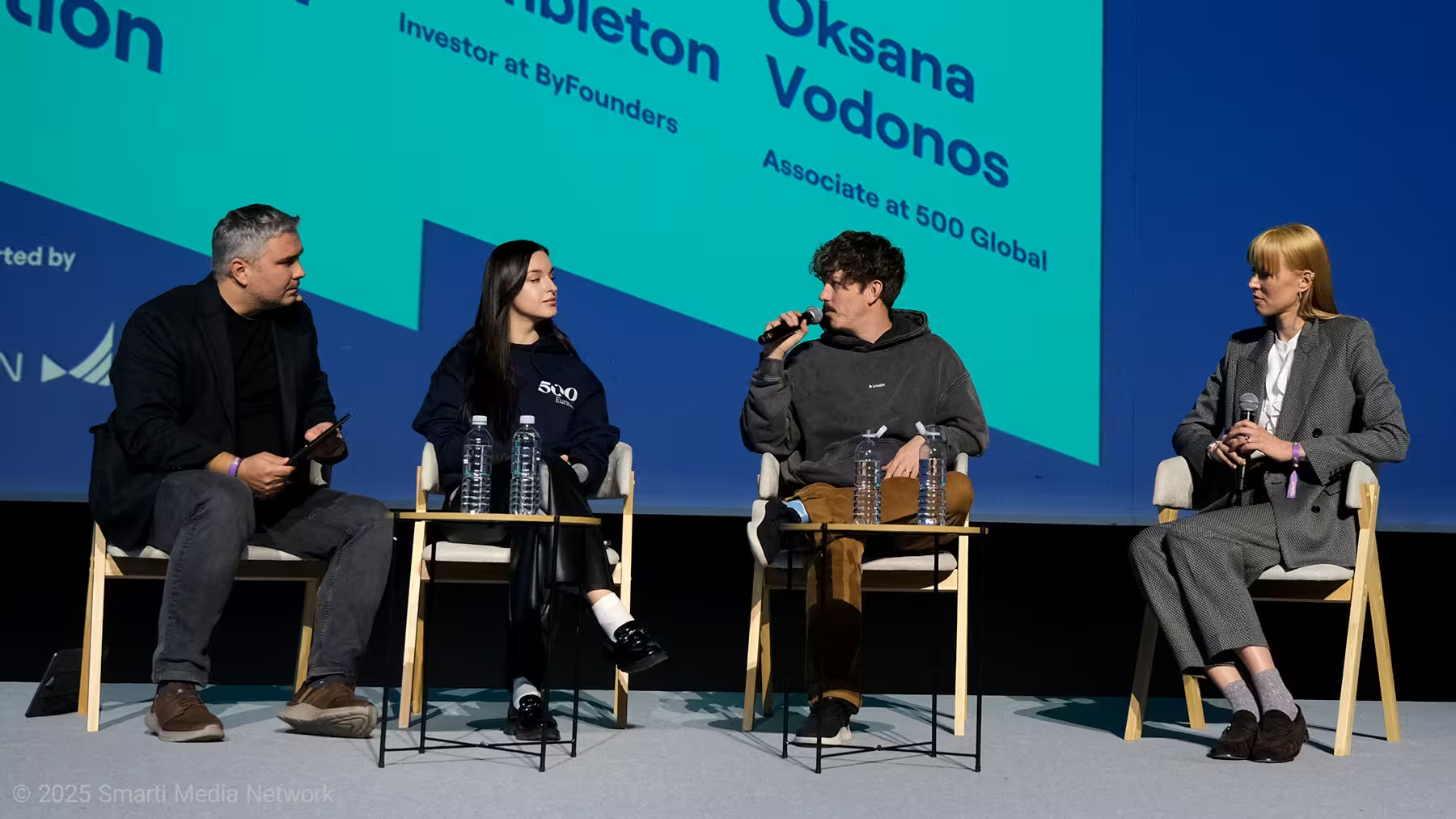
For Hambleton, the limiting factor isn’t technology but scale. “At unicorn stage you’re usually generating tens or hundreds of millions in revenue,” he said. “At that point, the cost of hiring even one person is trivial compared to your income. It’s always worth offloading part of the CEO’s time.”
Oksana Vodonos from 500 Global echoed the sentiment. Her firm, managing over $2.3 billion and more than 3,000 portfolio companies, has yet to back a solo founder. “AI can replace tasks,” she said, “but not vision, drive, or strategy. Having a co-founder isn’t just about splitting work — it’s about having a counterpart for ideas and resilience. That’s something AI cannot yet replicate.”
The Psychological and Human Limits
Kriaučionytė agreed that emotional resilience remains a human gap no machine can fill. “There are so many days when things don’t go as planned,” she said. “Having a co-founder to support you emotionally is irreplaceable. Unless AI reaches a level where it can fulfill human companionship, solo founding will stay emotionally hard.”
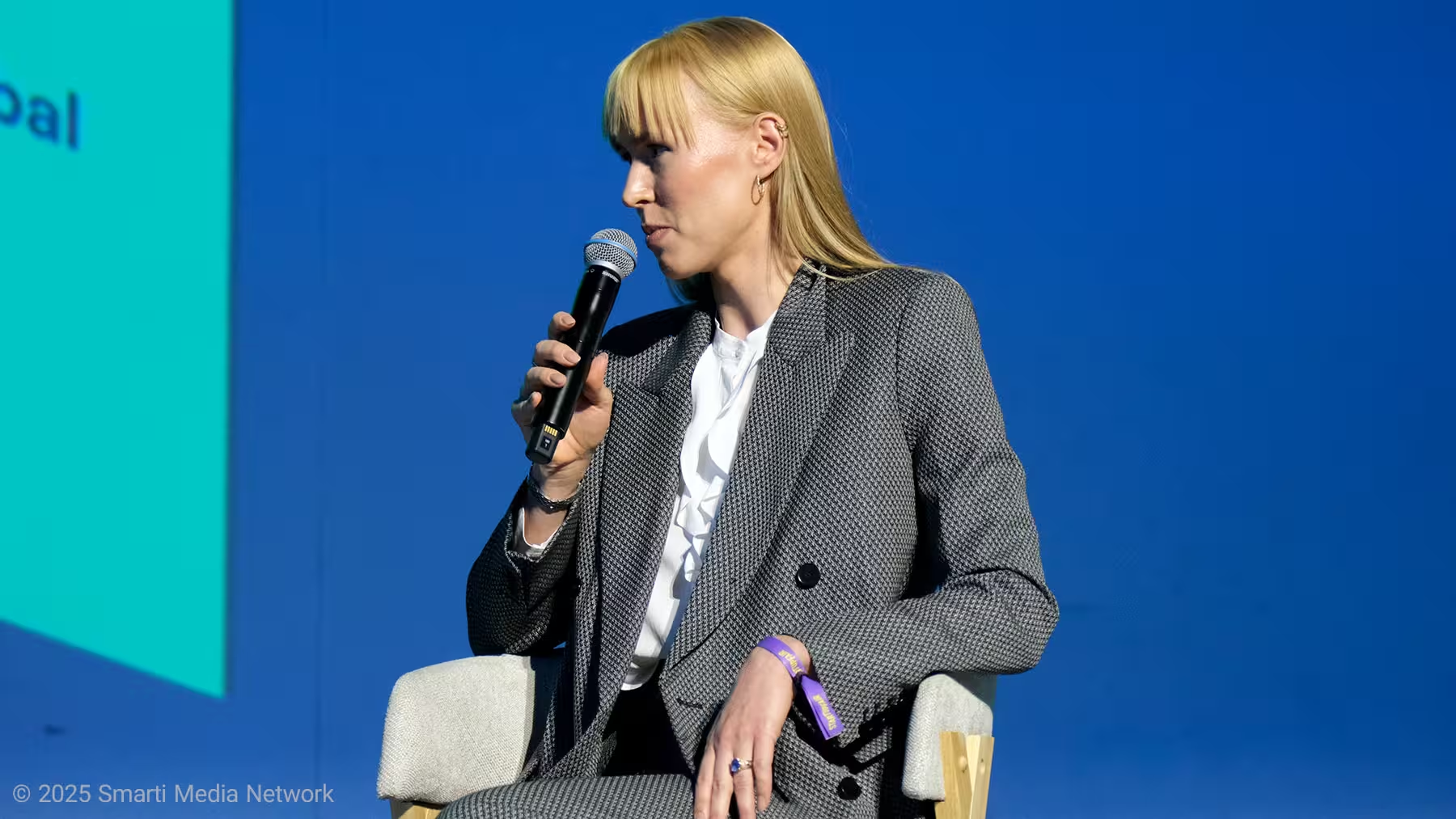
However, she predicted a near future where AI-powered personal assistants operate with near-autonomy. “I dream of a PA who does everything for me,” she said. “Right now, our AIs talk to each other constantly. It already feels like managing a 50-person team.”
When Would an Investor Bet €100 Million on One Person?
Romanas posed a hypothetical: “What would it take for you to invest €100 million in one founder?”
Hambleton laughed. “Well, for me personally, I’d be violating my fund’s agreements — and probably go to jail,” he joked, before turning serious. “But if I imagine a large enough fund, the only reason you’d do it is if success was nearly guaranteed — close to 100% probability.”
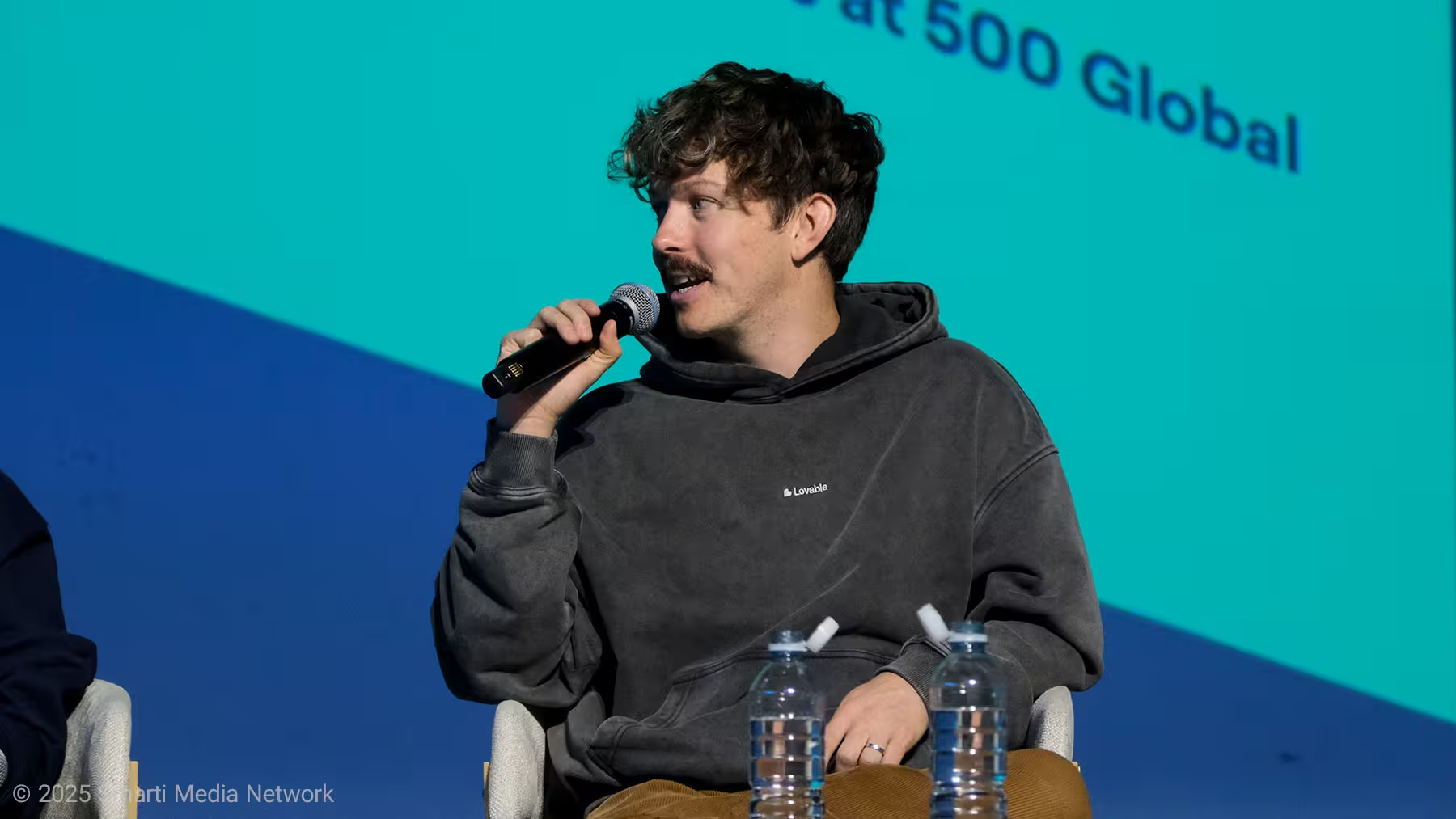
He explained that such confidence would only come with truly transformative technology. “If we reach artificial general intelligence that can automate all labor, you’re looking at a global market worth tens of trillions annually,” he said. “That scale justifies almost any valuation.”
Vodonos added that for her, smaller checks to solo founders are more realistic but still rare. “We’d need to understand why this person thinks they don’t need a team,” she said. “Is it because they can automate everything — or because they can’t hire good talent? I’d want to see a clear plan for how AI fits into that structure.”
The Human Side of Artificial Ambition
The panel then shifted from venture economics to human motivation. Romanas asked whether AI-driven entrepreneurship was purely about efficiency or if humans still crave collaboration.
Kriaučionytė’s answer was philosophical. “We’ll always need human connection,” she said. “I talk to ChatGPT like a therapist, but it’s not enough. Music, art, empathy — those are deeply human. The challenge is to design AI that helps us live better, not just faster.”
Vodonos agreed but added that using AI tools has already become a baseline expectation for competitiveness. “If you’re building without AI today, you’re falling behind,” she said. “Founders can now build prototypes, test hypotheses, run marketing, even automate sales. The speed is insane.”
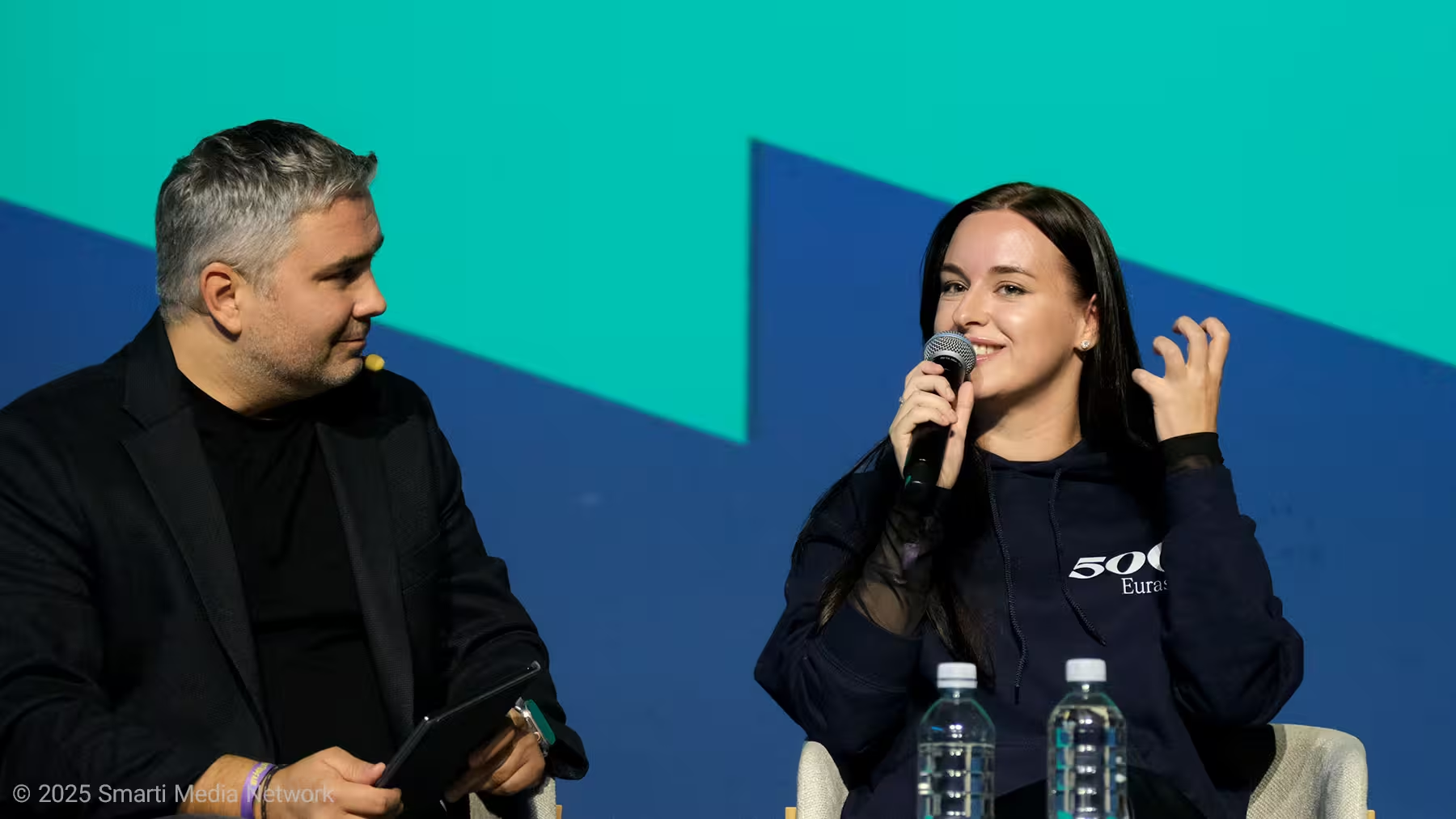
What Defines a Successful Founder in the Age of AI?
As the discussion deepened, Romanas turned philosophical again. “With all these new tools and possibilities, what does success even mean for a founder today? Is it money, efficiency, or something else?”
For Gabrielė Kriaučionytė, success remained a mix of measurable achievement and inner resilience. “Two things,” she said. “First, monetary success — I don’t want to build products no one uses. And second, how you handle crises. Every founder faces black holes in their business; surviving them defines success.”
Magnus Hambleton framed it in venture terms. “Success depends on perspective,” he said. “If you run a small business and live happily, that’s success. But for us investors, it’s about scale. To reach a billion-dollar valuation, you need a unique vision of the future and the ability to build something no one else can.”
Oksana Vodonos added a human layer: “For us, the founders we back are ambitious, passionate, and humble. Those traits make us say yes.”
Ethics, Empathy, and the AI Dilemma
Before closing, the moderator revisited the ethical dimension of AI-driven entrepreneurship. “Are we building AI for efficiency, or to make life genuinely better?” he asked.
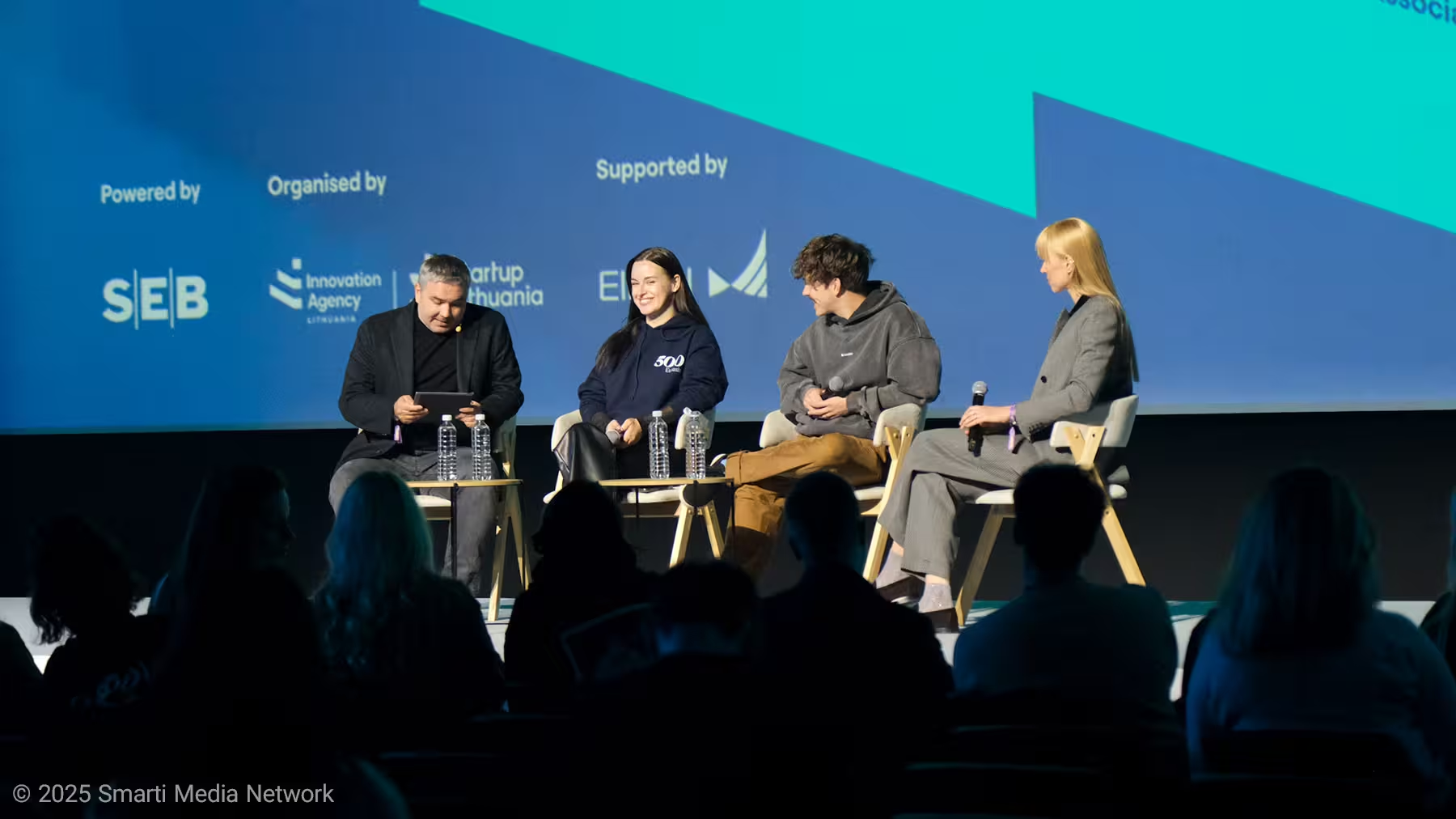
Kriaučionytė pointed out that while automation can make companies faster and leaner, it cannot substitute for meaning. “AI should exist to help every human live better,” she said. “But the structure of society today doesn’t necessarily guide us there.”
Vodonos noted that we are now in a “post-hype” era. “The initial fascination with AI is fading,” she said. “We finally understand its practical potential — not as magic, but as leverage. If founders don’t integrate AI today, they’re choosing to stay less competitive.”
Beyond Capital: Investing in Humanity
The panel also touched on personal values and ethics in entrepreneurship. Romanas highlighted Hambleton’s commitment to donate 10% of his income to effective altruism causes and asked about his motivation.
“I support charities that make the most measurable impact per dollar,” Hambleton explained. “For example, the Against Malaria Foundation provides mosquito nets to save children’s lives, and GiveDirectly transfers money straight to people in need. Statistically, you can save one life for about €2000 — that’s incredibly meaningful.”
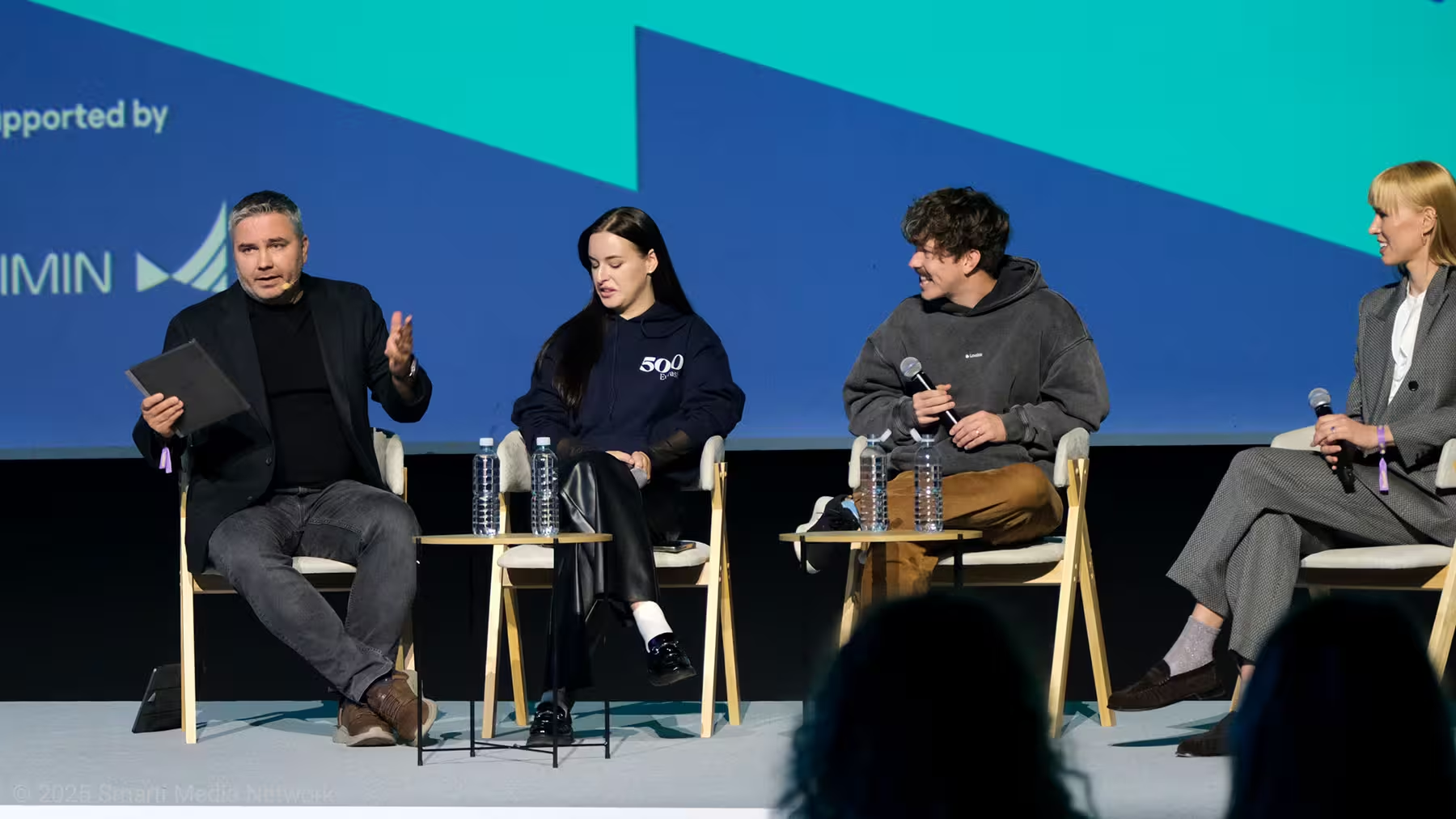
The audience responded with applause, acknowledging the intersection of tech, purpose, and compassion that the conversation had reached.
When Music Meets Machine Learning
The session took a lighter turn as Romanas asked Kriaučionytė about her side career as musician CLAIÄ. “We already have AI-generated songs,” he said. “But could we see music fully personalized — entire bands created only for one listener?”
“I think that’s already happening,” she said. “I know artists signing with Sony to build AI personas. Personalized music is amazing, but as a listener, I still need the human behind it. I need to connect with their story. AI can compose background music, but emotion still needs a person.”
Her perspective illustrated how AI might complement, not replace, creative work — amplifying individuality rather than erasing it.
Will the One-Person Unicorn Ever Exist?
As the session drew to an end, Romanas posed the inevitable final question to Oksana Vodonos: “So, when will we finally see a one-person, billion-dollar company?”
Vodonos smiled. “Let’s pray together to see it,” she said. “I’m very curious, but we don’t know when. Let’s wait, let’s build, and let’s develop the ecosystem that could make it possible.”
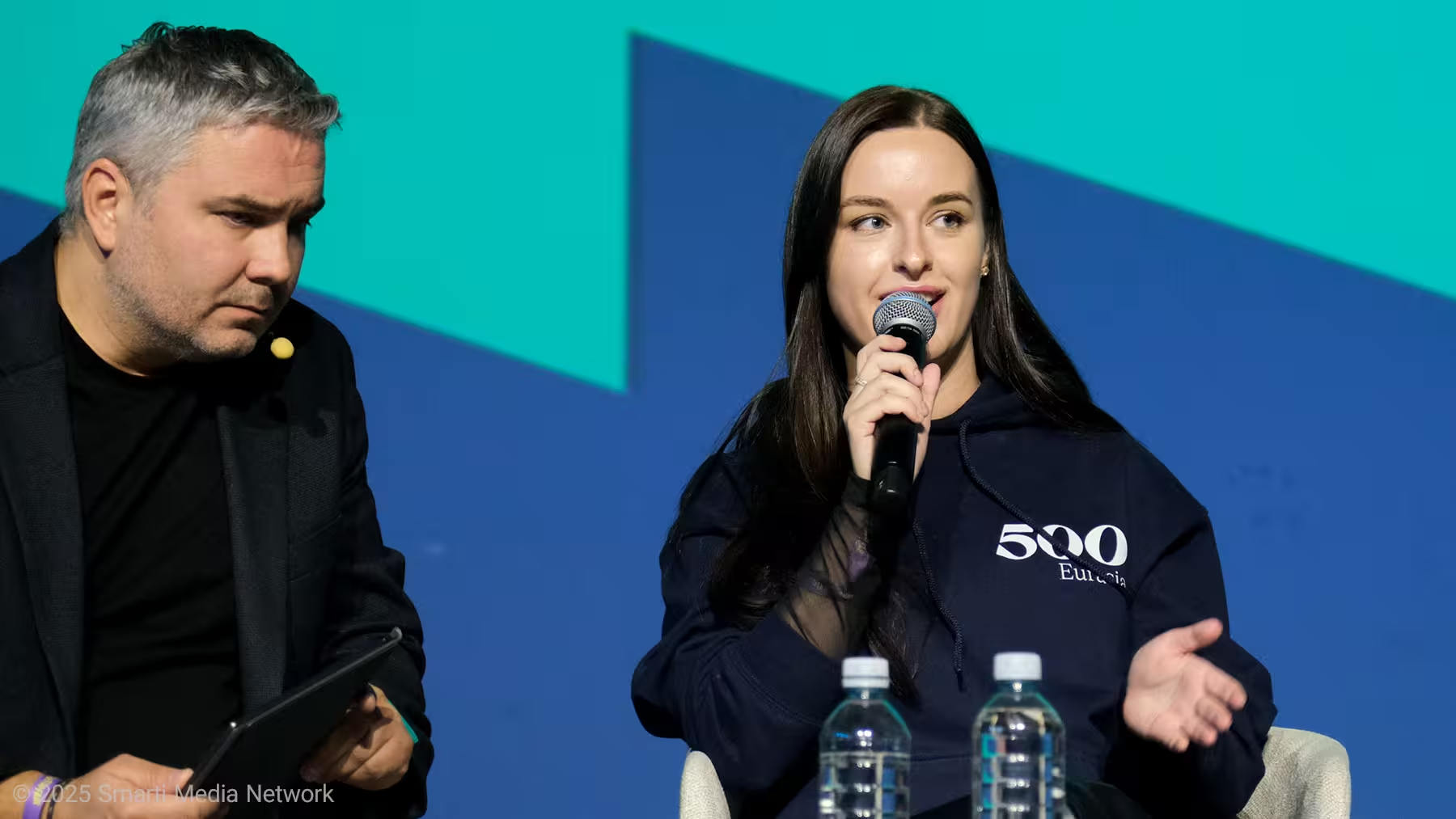
The audience laughed and applauded, closing one of the most forward-looking and philosophical panels of the day.
Romanas thanked his guests and encouraged the crowd to approach them afterward. “This is what Startup Fair is about — human-to-human interaction,” he said. “We build bridges here, between technology and people, between what’s real and what’s next.”
As the panelists left the stage, the crowd lingered, still discussing whether artificial intelligence could ever replace the messy, emotional brilliance of human collaboration — or if, as several speakers suggested, the real ambition was not to eliminate teams, but to redefine what teamwork means in the AI era.
.avif) | 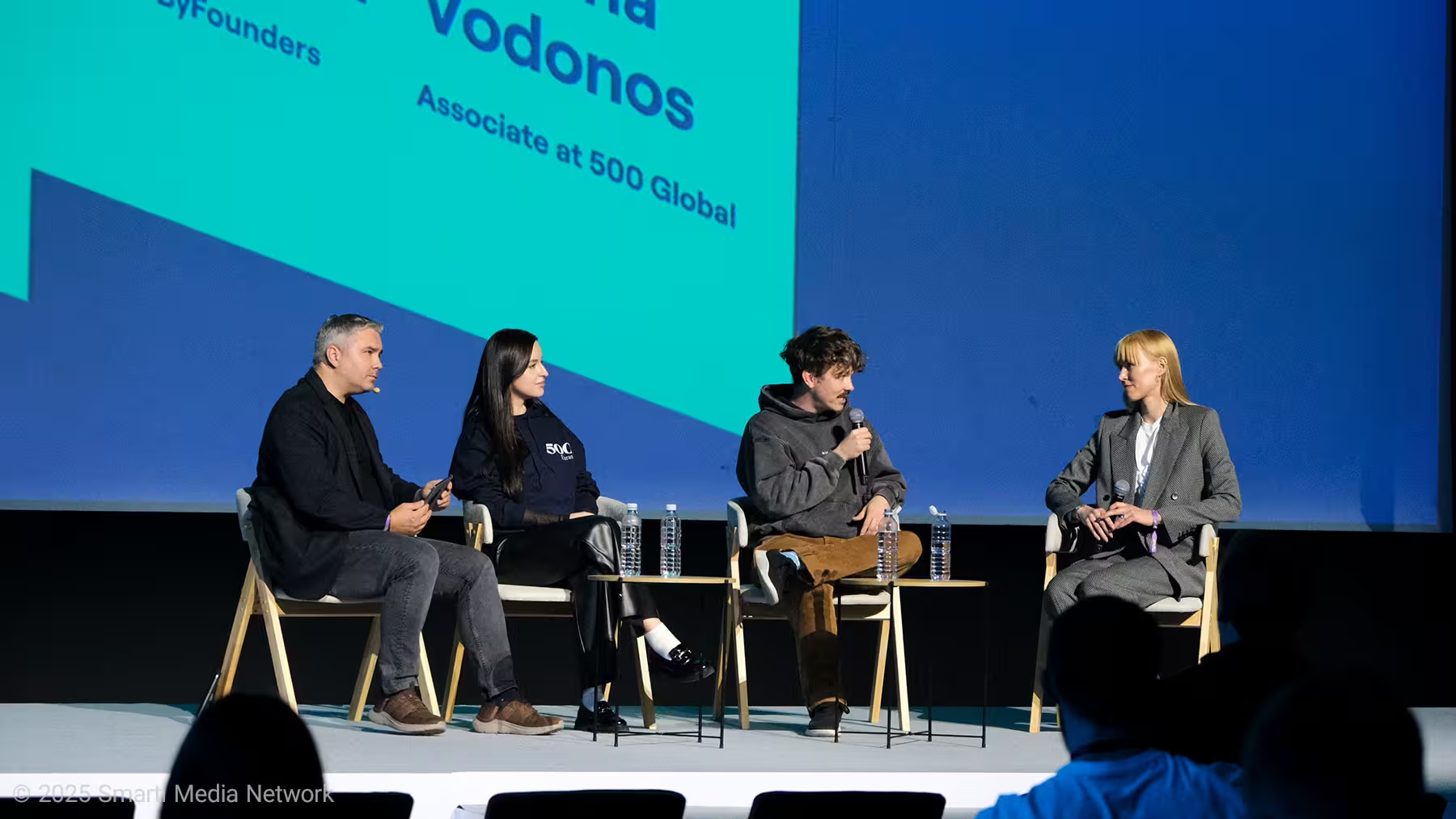 | 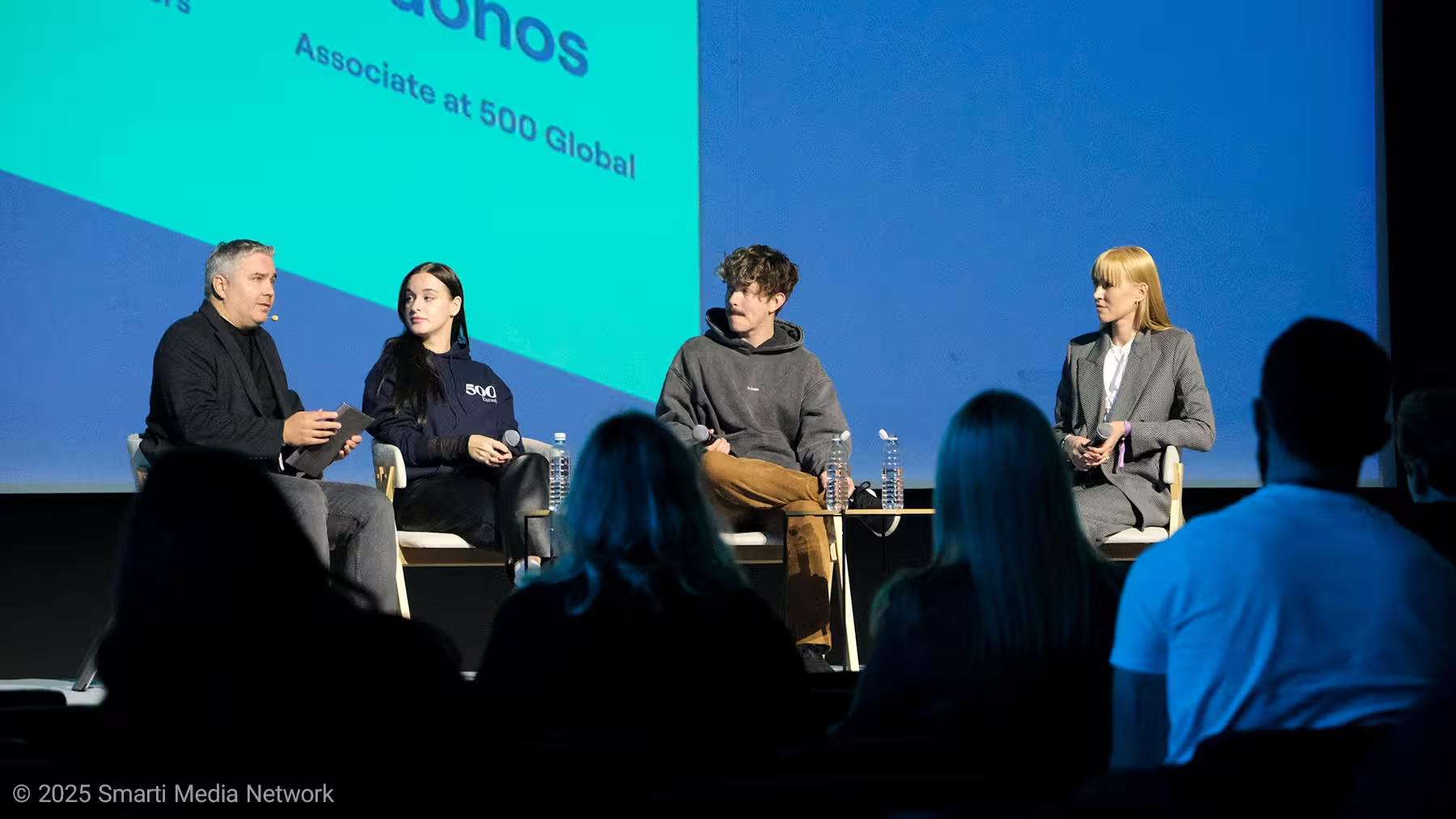 |
Comments
skyspin
Feels a bit overhyped but I loved the ethics bit. AI can speed things up, yet empathy, art and those messy human sparks arent just features to outsource. Investors betting on people still imo 🤔
Armin
I’ve automated chunks of my workflow, even have AI PAs, but solo at billion scale? nah. Also the lonely CEO thing is real, be careful
labcore
Is this even true? Investors talk scale, founders talk resilience. AGI aside, solo unicorn seems more idea than reality atm. Or am I missing sth
mechbyte
Wow didn’t expect the panel to go this deep, kinda mindblown. One-person unicorn plausible? If AI runs ops, sales, support... scary but cool, tbh

.webp)
Leave a Comment